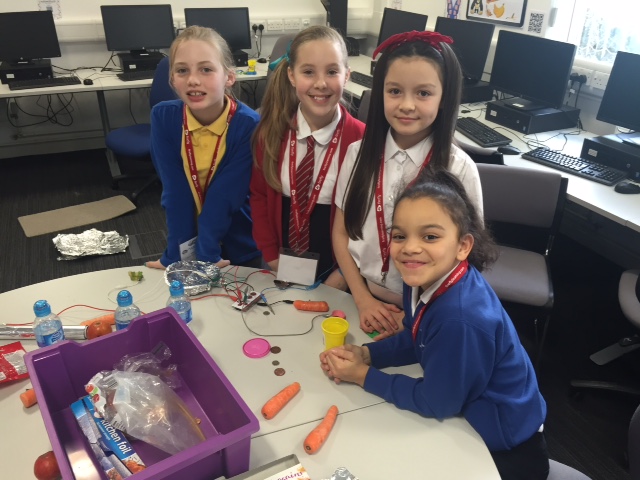Three blind mice, played on jelly, carrots and play-doh at the University of Northampton
Date 2.03.2016

Primary School Children from six local schools spent the afternoon using conductible materials, such as carrots, jelly and play-doh to explore and develop their coding skills at the University of Northampton.
Using tablets and MaKey MaKey innovation kits, a set of connectable cables that acts as a keyboard interface, and everyday objects primary school children created basic code to play games, create sounds and give directions to computer games.
Forty children from Northampton Academy Primary Trust schools; Simon de Senlis Primary School, Lings Primary School, Abington Vale Primary School, Ecton Brook Primary School, and Weston Favell Primary School, together with children from Standens Barn Primary School, used their coding and creative skills to design and build their very own computer games; everything from a tinfoil dance mat, to a programmable talking gummy bear!
This is event formed part of the University of Northampton’s Digital Leaders scheme, which sees University students take leadership roles within local schools and at the University, providing advice and practical sessions inspiring the use of technology for education.
Matt Oakley, a Teaching Assistant from Abington Vale Primary School and current student at the University of Northampton said: “”Events like today’s MaKey MaKey session aim to promote digital literacy in schools. Collaborating with the Northampton Academy Primary Trust schools and the University of Northampton, we have a fantastic opportunity to really inspire young people to develop digital skills.”
Primary School pupil, Lexy from Ecton Brook Primary School said: ”Today has been really fun. My favourite part has been meeting new people, combining our ideas and working to make our project work. If it doesn’t work, trying to fix it.”
Helen Caldwell, Senior Lecturer in Education at the University of Northampton said: “Coding promotes problem solving, teamwork and analytical thinking – and those who code from an early age will have a real advantage in the future jobs market. Sessions like the one today, teaching physical computing in the real world, connects our students with local schools to inspire creative use of technology for education.
The new computing curriculum aims to promote computational and creative thinking in young people, and through our courses at the University of Northampton we have many practical opportunities for our students to work with school children. A challenge based learning approach means that our students develop creative and practical teaching ideas to inspire children early in their studies, alongside the academic underpinning of the course.”
Video created by Jack Gilbert, 3rd Year BA SEN and Inclusion student